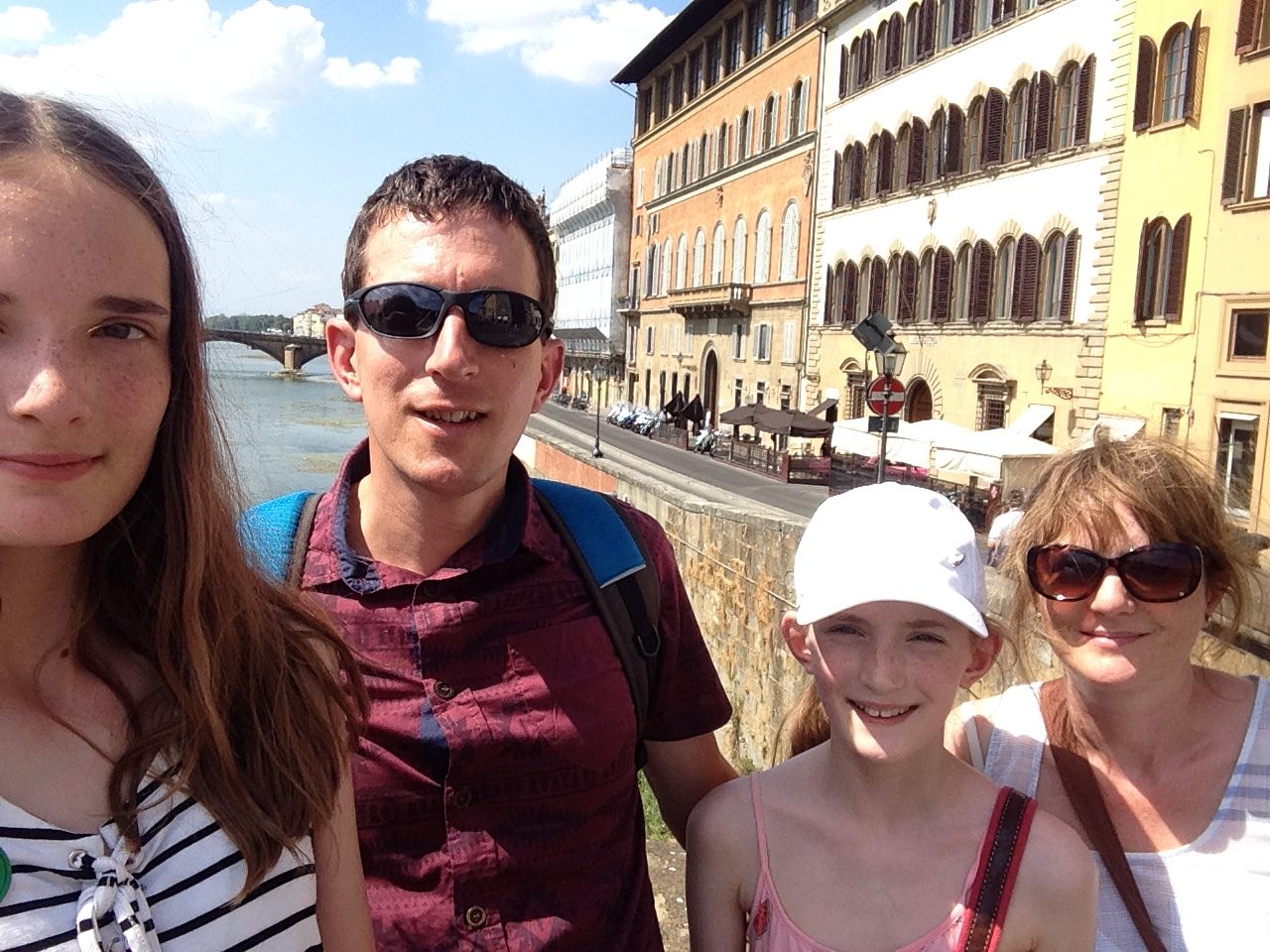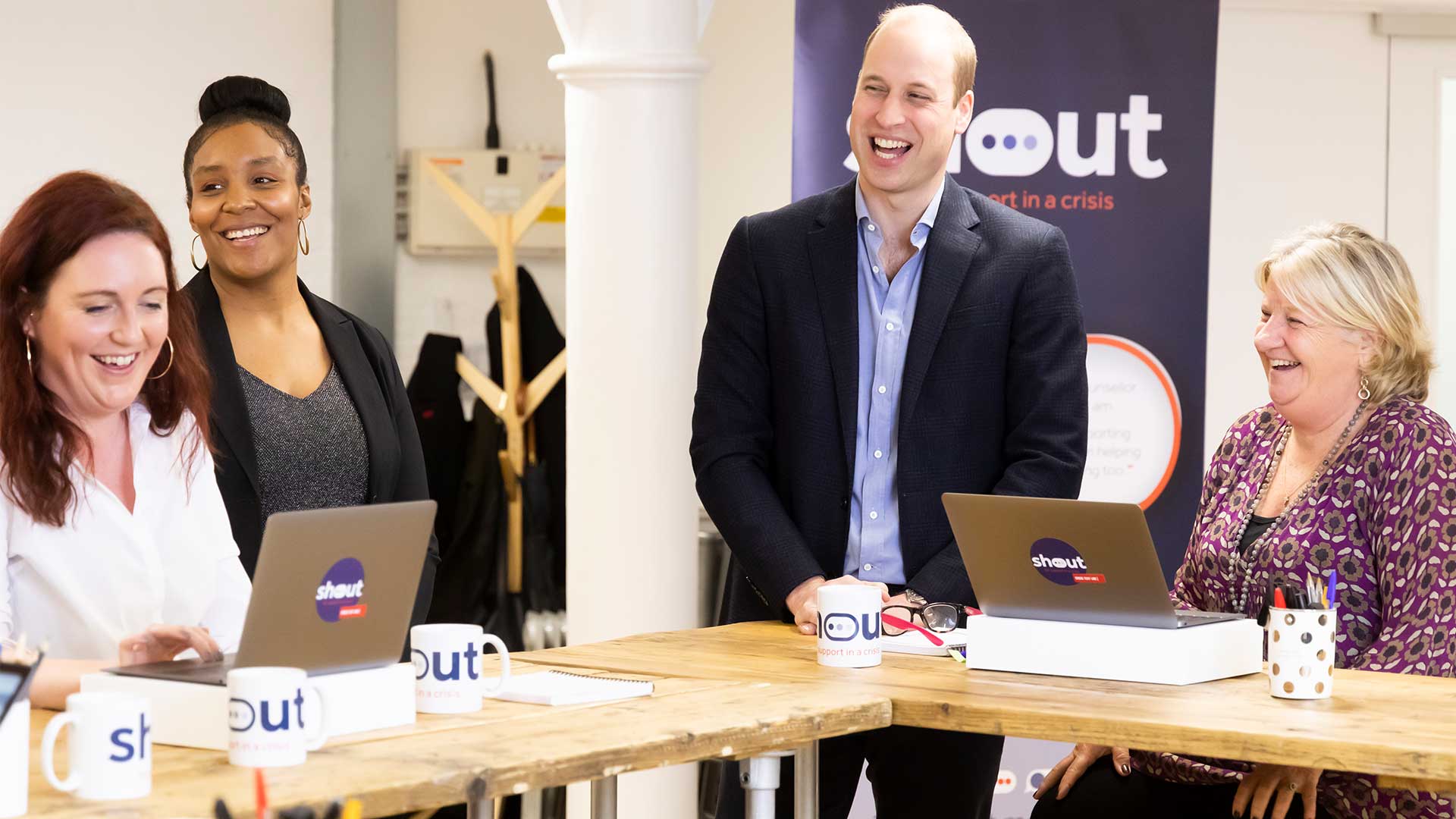Olga is a Co-Chair at the iChoir, she talks to us about her experience in the choir, how singing can help your mental health and how the choir felt about performing at The Community Shield for the Heads Up campaign.
Tell us how you came across the choir?
Myself and the other Co-Chair, Cath, used to work for a mental health charity and the choir sort of started as a staff choir and then people who use the service started to come to it. Then we became independent and a community choir and it grew organically from there. People started coming to the choir, they enjoyed it and fourteen years on it’s still going and Cath and I are still here!
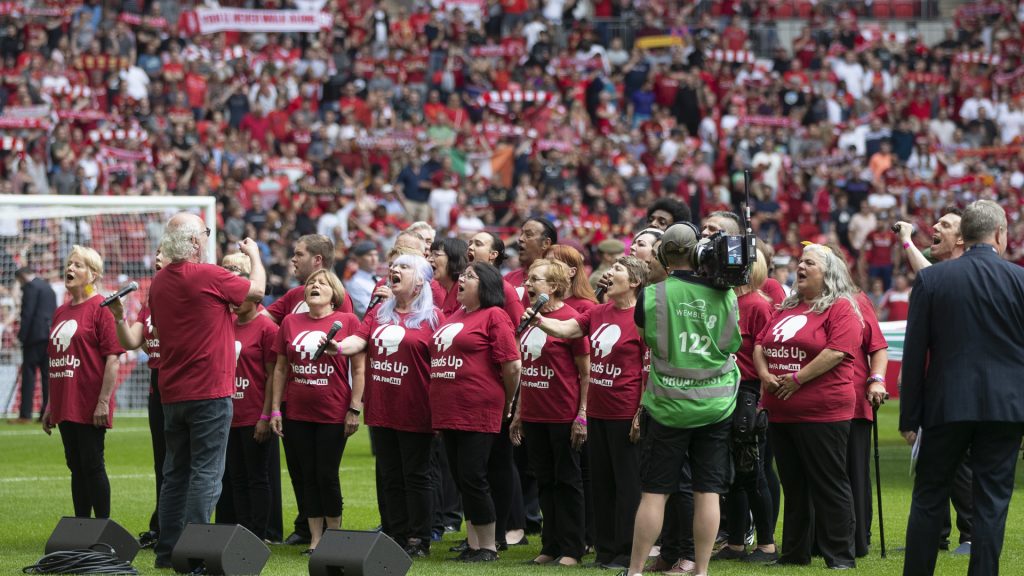
That’s amazing how much it grew over the years! Can you tell us how it grew so much?
It started with a small group of us as mentioned and by word of mouth I guess more and more people came and the choir grew. We thought it was a good thing to do, because it’s more than just a choir it’s a community, we sing and perform and our ethos is ‘Singing for good mental well-being’. People like to come and it’s also a social network for people, because they’re coming to a choir that is non-judgmental. We’re a group of people that are very empathetic and we just get together to sing and singing really does make you feel better. Scientifically singing in a community choir has shown that it is very good for you especially in a group.
It sounds like you’ve got a great community feel to the choir. Apart from singing are there any other activities that you do?
Of course we perform regularly and we do lots of social things together, we’ve gone away to record in Northumberland. It’s not just a small group of people with mental health who come together it’s for everybody really and hopefully this helps normalise mental health. That is the whole reason behind the choir, to sing together, support each other, to be able to talk openly and be comfortable about talking.
Time to Change funded us on a very successful campaign we called Raise Your Voice. We went into the local community, and held workshops on song and lyric writing, themed around talking about mental health. Our hope was that people would open up about their mental health or at least be comfortable talking about it. The workshops were a great way to get people to talk, share and write things down. The group would find a subject for a song from the discussion and the choir took some of the things that people wrote down and turned them into lyrics and a song, then we recorded it and produced a CD; in fact some people who came to the workshops ended up singing lead with us and the choir provided the back- up chorus! It was a really successful campaign because even getting people to write down their thoughts helps their mental health massively. It helps them to clearly recognise their feelings. It’s ok to talk.
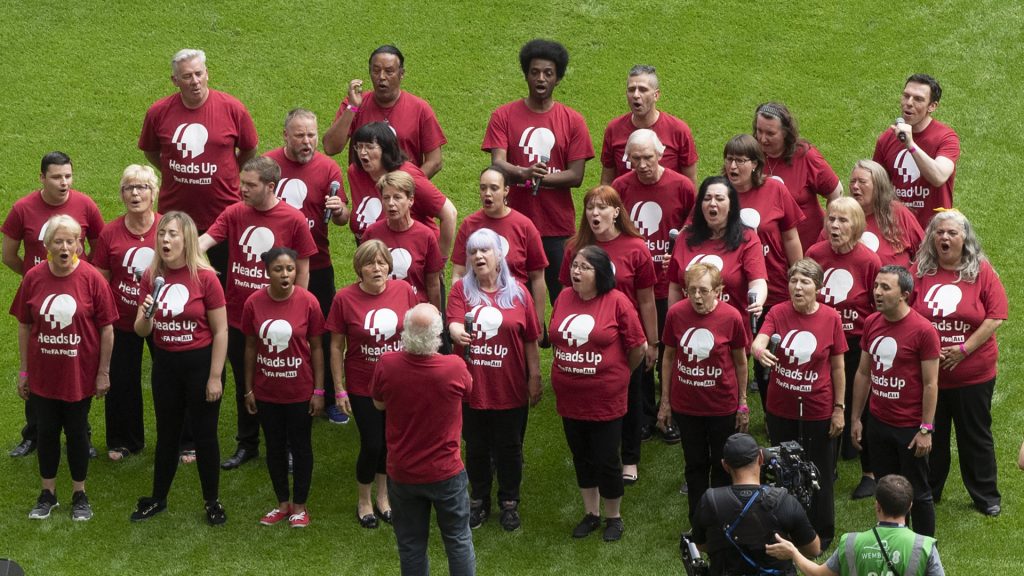
It certainly is so important to talk and that’s of course what Heads Up aims to do. Can you tell us how you came across Heads Up?
We were contacted by the Heads Up campaign team, I think they knew about us through our Raise Your Voice campaign so they got in touch.
When we heard about the Heads Up campaign and the idea behind it we thought it was something we’d love to be involved with. Using football as a way of reaching people and getting them to talk about their mental wellbeing is such a good idea, so many people will hear the message nationally and internationally and it normalises mental health.
How does the choir benefit people?
Singing lifts the mood and the choir offers space for people to talk. We explain about our ethos, singing for good mental wellbeing, some people come to the choir and they don’t want to talk about it and that’s fine, but it’s just about giving people that community and space to feel like they can open up. People also make connections with each other and gain confidence and it’s changed a lot of peoples lives for the better.
You’ve talked about how the choir has changed peoples lives for the better, can you give us some examples?
We had a guy who had severe mental health issues, he was very low in confidence and would keep is head down the whole time at first and not really sing. The weeks went by and he grew in confidence, from there he decided to take a music course at the local college. And for you and I that might be nothing, but for him it was an enormous step especially being in his late forties and being under this mental health cloud. He found purpose and belief in himself, felt good about learning new skills, passed his course and went on to do another. It’s also not just him though, it’s had a knock on effect on his whole family, he used to become ill and was hospitalised every six months. But when he joined the choir he felt better and didn’t go to hospital, which sounds miraculous but it really was. It’s called social subscribing, going to more social things like football or social groups helps a lot.
Recently a lady joined us whose husband died and she said “Well I wish I’d known about the choir when my husband died I would have had some support.” Bereavement is a huge thing and sometimes people don’t understand or connect mental health with what they’re going through.
What are the core beliefs of the iChoir and what do you say to new members when they join?
Well basically our ethos is we’re all here to sing because it’s good for your mental wellbeing, we explain how singing helps with this and that it’s a safe place to speak to people about things if they want to. Singing boosts confidence and our ethos of being open and talking plus having the community as a support network around helps enormously
We entered a Choirfest three weeks ago and one of the guys before he went on stage got quite nervous, one of the other guys got hold of his arm and they walked up together and got through the performance (we actually won a cup!) that’s the sort of support the choir offers, you can do it, we can get through together.
I think maybe the biggest thing for us is that everyone is accepted for who they are.
How is everybody feeling about singing at the Community Shield? Are they excited?
We are so excited! I’ve never been to a football match but I think it must be similar to being in a choir, because when you’re in a group like that, you sort of feed off each other. The choir are thrilled though, they’ve been practicing, learning their lines and the whole idea of just being there for such an incredible cause means a lot to us. It’s good to get that sort of recognition, it’s an absolute honour.
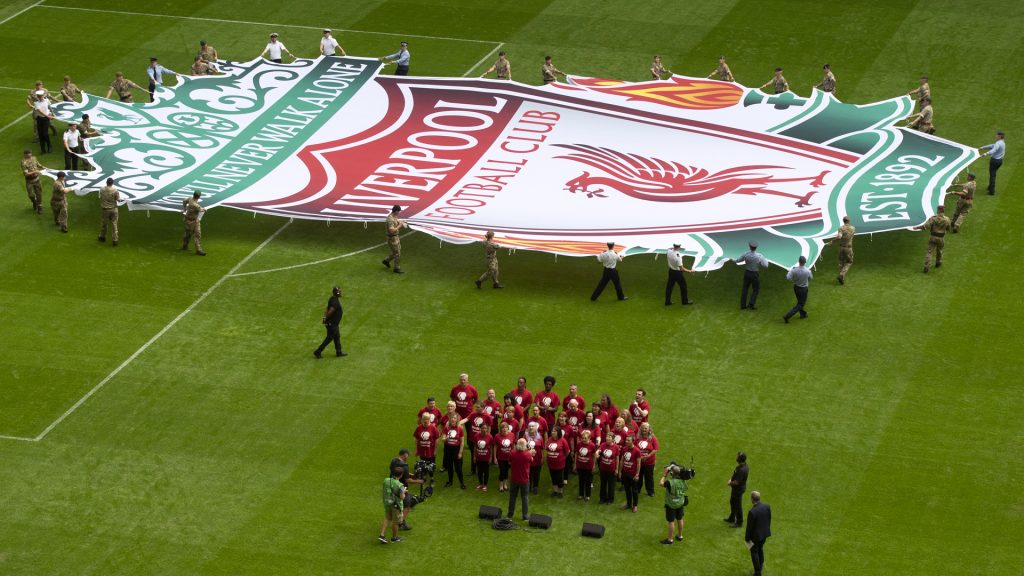
What song will you be singing on the day?
We’ll be singing the Liverpool Football Club anthem, ‘You’ll Never Walk Alone’ and of course this is a perfect song choice because the whole day is about togetherness and supporting each other.
What do you think the song represents for you and the choir?
Well I mean the words say it all; ‘You’ll never walk alone, when you walk through a storm hold your head up high.” It’s the feeling that you can get through things, when you’re feeling low, there are people there through the storm and at the end of the storm too, come through to a golden sky. I think it’s important to remember that if you’ve got the support of caring people you’ll never be alone. You don’t have to be a mental health professional, it’s all about people coming together, just being there to support and listen to each other. Things do change and they can change for the better. The choir is also a good mix of people of all ages and backgrounds.
What inspired you to join iChoir?
I enjoyed singing a lot and it just sort of gives you a good workout. And when you sing a couple of songs you feel really good, it releases endorphins and you feel better, uplifted. I recommend it.
What’s the general atmosphere like in the choir?
Friendly and happy! It’s good to be there. At the end of the choir, everyone is buzzing and talking. The choir is a balance, we don’t take ourselves too seriously either, we usually have a tea break in between to talk. The music director always makes sure there’s a balance of music, singing time and talking time, giving people the opportunity to take a break and chat to each other. Some people will go to the local pub and have a beer. A few people have gained loads of confidence and now they have a ukulele group and they’re brilliant. They’re in the finals of a competition this weekend before Wembley so if they win there’ll be lots to celebrate. These are the sort of things that the choir helps people with, it’s confidence and once people have built that, it spreads to other areas of their lives and they take on new things!
We used to have a choir member, who has sadly passed away now, he would come along every week without fail, although his singing wasn’t the best we all loved to see him and he enjoyed the socialising. He was first supported with two care workers, then gradually one and then he became confident enough to come on his own in a taxi and then on the bus, he had quite a long way to come too. I mean it took him a couple of years to get to that stage but again this was a big thing for him to do. He wouldn’t always sing either but he enjoyed the community and being around people he could trust to talk to if he needed to.
And finally, what does singing at the Community Shield mean to you and the rest of the choir?
Well it’s a brilliant opportunity to reach a wider audience, not just for the choir but for acknowledging we need to be open and talk about mental health. An honour to be chosen and to be part of Heads Up. Hopefully we will get some more members and we’re hoping to make a difference just by being present on the day. We’re also hoping that the message of opening about mental health will spread and help others to open about it too. There’s no health without mental health.
